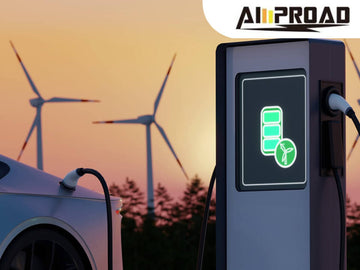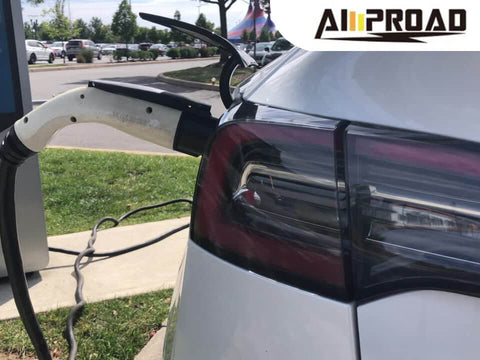
A J1772 charger is an electric vehicle (EV) charging station built according to the widely accepted SAE J1772 standard. This standard ensures a universal interface for plug-in electric vehicles, promoting compatibility across different EV models and providing a consistent charging experience. These chargers are commonly installed in public spaces, parking garages, and residential settings, offering convenient access to EV owners. The J1772 standard supports both Level 1 and Level 2 charging, with Level 2 delivering faster charging speeds at 240 volts. Due to its broad use, the J1772 connector plays an essential role in the global EVSE.
How rapid is the charging speed of a J1772 charger?
The speed of charging with a J1772 charger is contingent upon its designated power level. J1772 chargers usually function at either Level 1 (120V) or Level 2 (240V) charging rates. Level 1 chargers, with their standard 120-volt output, tend to be more deliberate in charging electric vehicles. On the other hand, Level 2 chargers, operating at 240 volts, provide a faster and more efficient charging process, making them a preferred choice in public spaces and dedicated charging stations.
The charging duration for electric vehicles using a J1772 charger depends on various factors, including the charger's power level, the vehicle's battery capacity, and its current charge level. Generally, Level 1 chargers may necessitate several hours to achieve a full charge, making them suitable for overnight charging. In contrast, Level 2 chargers significantly reduce charging times, typically taking only a few hours to provide a substantial charge. This makes Level 2 J1772 chargers more practical for quick top-ups during the day or when time is of the essence.
What power does a Level 2 J1772 charger deliver?
Operating at 240 volts, a J1772 Level 2 charger represents a pivotal advancement in electric vehicle (EV) charging technology. These chargers boast the capability to deliver power ranging from 3.3 kW to an impressive 19.2 kW. This higher voltage and power range contribute to the increased efficiency and speed of charging, making Level 2 chargers a preferred choice for EV owners looking for faster and more convenient recharging options. It's not just about the voltage; it's the substantial power delivery that distinguishes Level 2 J1772 chargers in the realm of electric vehicle charging.
In the realm of electric mobility, Level 2 J1772 chargers have become a common sight in public spaces, making them easily accessible for EV users on the go. Whether in parking lots, shopping centers, or other public locations, these chargers cater to the growing demand for efficient and rapid charging. In this landscape, Amproad stands out as a noteworthy Level 2 EV charger supplier, contributing to the widespread availability of these charging stations. Amproad's commitment to providing reliable and high-performance Level 2 J1772 chargers aligns with the growing needs of the electric vehicle industry, ensuring that users have access to swift and dependable charging solutions.

How much time does it take to charge an electric vehicle using a J1772 charger?
The charging time for electric vehicles using a J1772 charger is influenced by several key factors, making it a variable yet manageable aspect of electric vehicle ownership. One critical factor is the charger's power level, with J1772 chargers commonly operating at either Level 1 (120V) or Level 2 (240V). Level 1 chargers, typically utilizing a standard 120-volt household outlet, are known for their slower charging rates, often requiring several hours to achieve a full charge. This makes them well-suited for overnight charging scenarios, where time is less of an immediate concern.
In contrast, the use of Level 2 J1772 chargers can significantly reduce charging times. Operating at 240 volts, these chargers can deliver power between 3.3 kW and 19.2 kW, allowing for a more efficient and expedited charging process. With their faster level 2 charging capabilities, Level 2 chargers become particularly advantageous for electric vehicle owners looking to top up their batteries during shorter stops, providing a substantial charge within just a few hours. This accelerated charging speed caters to the practical needs of individuals with busy schedules and limited downtime.
The overall charging duration is also contingent on the electric vehicle's battery capacity and its current state of charge. Larger battery capacities generally require more time to reach a full charge. Additionally, if the vehicle's battery is only partially depleted, the charging time will be shorter compared to a complete recharge. As the electric vehicle market continues to advance, and with the increasing prevalence of Level 2 chargers in public spaces, the landscape of EV charging is becoming more tailored to meeting the demands of users seeking a balance between convenience and charging efficiency.
Are all electric vehicles compatible with J1772 chargers?
Indeed, the majority of electric vehicles are designed with compatibility in mind, featuring a J1772 charging port that allows seamless integration with J1772 chargers. This standardization ensures a universal charging experience for a wide range of electric vehicle owners. However, it's essential for electric vehicle owners to verify the charging port specifications of their specific models to confirm compatibility.
For Tesla owners, while Tesla vehicles typically come with their proprietary charging connector, known as the Tesla Connector, the adaptability of the J1772 standard adds an extra layer of convenience. Tesla Destination Charger, a network of Level 2 chargers specifically designed for Tesla vehicles, can be utilized by Tesla owners with a J1772 adapter. This adapter allows Tesla owner to connect the vehicle to J1772 charger seamlessly, expanding the charging option beyond the Tesla Supercharger network. This compatibility exemplifies the adaptability and collaboration within the electric vehicle charging ecosystem, allowing users to choose from a variety of charging stations, including those conforming to the J1772 standard.
As electric vehicle charging infrastructure continues to expand globally, the prominence of J1772 chargers in public spaces, workplaces, and residential areas further reinforces their relevance. This widespread adoption of the J1772 standard not only benefits electric vehicle manufacturers but also contributes to the convenience and accessibility of charging solutions for electric vehicle owners from various brands, promoting a more inclusive and user-friendly charging experience.
Do faster charging options exist for electric vehicles?
For electric vehicle owners seeking expedited charging, there are faster options available beyond the Level 2 chargers commonly associated with the J1772 standard. Some electric vehicles are equipped with DC fast charging capabilities, providing significantly shorter charging times compared to Level 2 EV charger. Although DC fast chargers do not adhere to the J1772 standard, they are readily accessible at dedicated charging stations, allowing electric vehicle users to benefit from rapid charging speeds.
DC fast chargers operate on a higher voltage and power level, enabling them to deliver a substantial amount of energy to the vehicle's battery in a shorter timeframe. While Level 2 chargers are instrumental for daily charging needs, DC fast chargers are particularly advantageous during long-distance travel or when quick top-ups are essential. This diverse charging landscape caters to the varying needs of electric vehicle owners, offering flexibility and choice in selecting the most suitable charging option for their specific requirements.

How to Choose a J1772 Charger?
When navigating the selection of a J1772 charger for your electric vehicle, a thoughtful evaluation of charging speed becomes paramount. Opting for a Level 2 J1772 charger, operating at 240 volts, can significantly enhance your charging experience, offering efficiency and speed. Whether considering the convenience of overnight charging with a Level 1 charger or the quicker capabilities of a Level 2 charger, understanding your daily charging patterns is key.
Equally crucial is confirming the compatibility of your electric vehicle with the J1772 standard. While many vehicles incorporate a J1772 charging port, it's advisable to verify this and, if needed, explore adapters. In this landscape, reputable suppliers like Amproad play a vital role. Their commitment to providing reliable Level 2 J1772 chargers ensures a seamless and efficient charging process. Lastly, for home installations or collaborations in public spaces, considering the power supply requirements is essential. By integrating these considerations and potentially partnering with trusted suppliers like Amproad, you can confidently select the J1772 EV charger that aligns with your electric vehicle charging needs, combining reliability with convenience.
How prevalent are J1772 chargers in public charging stations?
J1772 chargers have become a ubiquitous sight in public charging stations, catering to the growing demand for electric vehicle (EV) infrastructure. These chargers, particularly Level 2 units, are commonly found in various public spaces, including parking lots, shopping centers, and commercial establishments. The widespread adoption of the J1772 standard in public charging reflects its acceptance as a reliable and universal solution for EV owners seeking convenient and accessible charging options.
One notable characteristic of SAE J1772 chargers is their compatibility with a diverse range of electric vehicles. While designed to adhere to a standard, the J1772 connector is versatile enough to accommodate different EV models, promoting inclusivity in the expanding electric mobility landscape. This compatibility has contributed to the prevalence of J1772 chargers, making them a go-to choice for public charging infrastructure planners aiming to serve the diverse needs of the growing EV user community.
J1772 chargers play a crucial role in the expanding public charging network, offering electric vehicle owners dependable access to EVCS across various locations. As the electric vehicle market grows, the widespread availability of these chargers significantly boosts the adoption and convenience of electric mobility. Providers such as Amproad are instrumental in this progress, ensuring high-quality charging solutions are readily available in public spaces. Through their contributions, Amproad and similar companies help integrate J1772 chargers into public charging infrastructure, supporting a sustainable and convenient experience for EV drivers.


